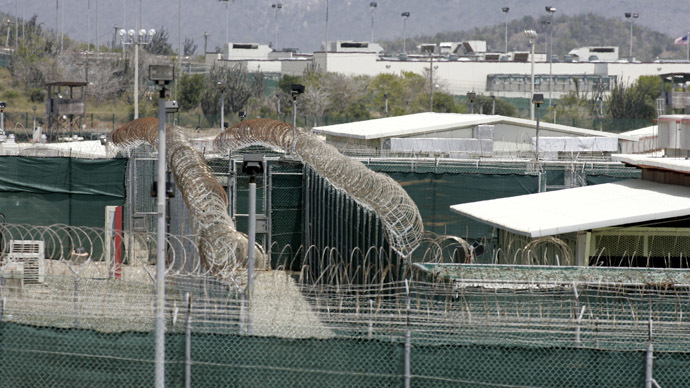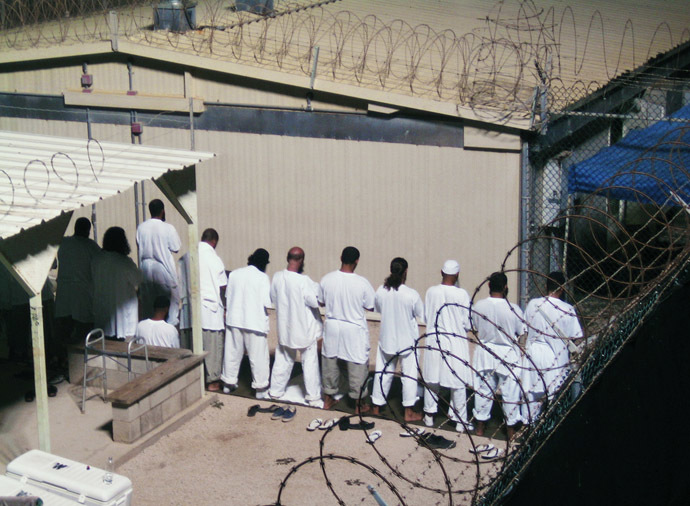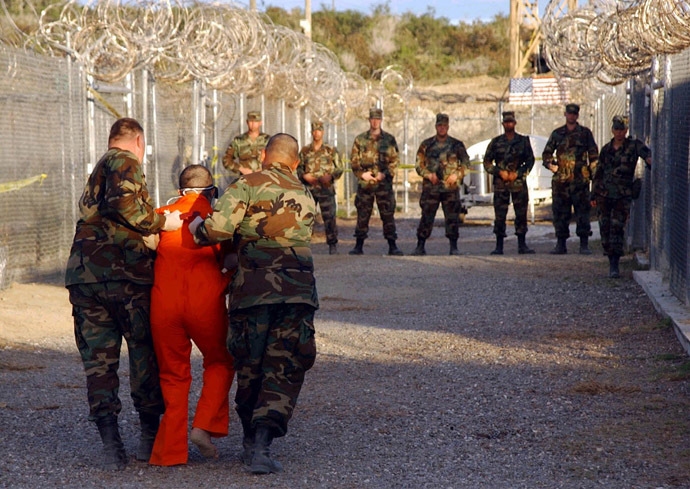Broken promise: Obama ‘would’ve closed Guantanamo on first day’

Barack Obama says if he could return to the first days of his presidency, he would close the Guantanamo Bay prison immediately. The president has made numerous pledges to shut the facility, but it still continues to operate.
Speaking at an economics conference in Cleveland, Ohio, Obama responded to a question posed by a teenager, who asked him what he would like to change from the first day he was elected head of state.
“I think I would have closed Guantanamo on the first day,” Obama said at the conference. "I didn’t at that time because we had a bipartisan agreement that it should be closed." He was speaking about his Republican rival for the 2008 vote John McCain, who had hinted during campaigning that he was also not opposed to closing the facility.

During campaigning he called Guantanamo “a sad chapter in American history,” while promising if he was elected that the detention center would be closed in 2009. After being voted into the White House, he reiterated this promise in a television interview with ABC.
READ MORE: Obama could use controversial executive order to shut down Gitmo – report
However, in November 2009, Obama was forced to back track saying it was impossible to set an exact date for closing the controversial facility.
On numerous occasions, the president has blamed Republican opposition in Congress for not being able to get the military prison closed. In his penultimate State of the Union address as president in January, he reiterated his determination to close the prison and fulfill one of his 2008 election pledges.
READ MORE: Gitmo-go-round: No solution in sight on 11th Guantanamo anniversary
“As Americans, we have a profound commitment to justice, so it makes no sense to spend $3 million per prisoner to keep open a prison that the world condemns and terrorists use to recruit,” he said, as cited by the Guardian. “Since I’ve been president, we’ve worked responsibly to cut the population of Gitmo in half. Now it’s time to finish the job. And I will not relent in my determination to shut it down. It’s not who we are.”
Despite his claims of Republican obstruction, Obama actually has the power to push his legislation through and close the facility. Congress has overpowered the president by bundling the measures in with the National Defense Authorization Act (NDAA), the overall defense budget of the country. Obama can veto the entire piece of legislation, but not to challenge it.
Each time Obama has threatened to close Guantanamo, opponents in Congress have become more stringent in their opposition, and he has backed down on every occasion. According to anthropologist Dr Mark Mason when speaking to RT:
"The United States has an operation that can only be described as a medieval torture chamber.It’s in violation of Geneva Convention, and in violation of the US constitution. It violates legal principles such as trial by jury that goes back thousands of years."

During Obama’s Nobel Peace Prize acceptance speech in Oslo in 2010, he said: “Pent-up grievances fester, and the suppression of tribal and religious identity can lead to violence.”
While these did not lead to violence, it did cause a significant number of prisoners at Guantanamo Bay to go on hunger strike for over 200 days.
READ MORE: Behind the wire: RT goes inside Gitmo (VIDEO)
At its peak in July 2013, more than two-thirds of Guantanamo’s 166 prisoners were refusing food. It began in February 2013, when several prisoners accused guards at Camp Delta of confiscating their books, letters and other personal possessions, as well as restricting their activities for no obvious reasons. Several inmates said US officers mishandled their copies of the Koran.
There was also the underlying factor that a large number of the detainees were being kept at the facility, despite being cleared for release, while Obama’s numerous promises to close the prison never materialized.
Human rights groups chastised the US for force-feeding inmates, while Ramzi Kassem, a Gitmo detainee lawyer based in New York, told RT: “The force feeding that my clients have experienced at Guantanamo, they’ve certainly described it as torture. The restraint chair that they’re strapped to, they’ve actually called ‘a torture chair.’”
Journalists have complained that basic information about the prison complex in Guantanamo Bay is being withheld from the public, despite the fact that the Bush administration freely shared this data. The media says it finds it difficult to ascertain how many inmates are on hunger strike, or how frequently assaults on guards take place.
READ MORE: Gitmo hunger strike: Timeline
RT had to undergo months of negotiations with Guantanamo to get access to the prison. AP's Washington bureau chief, Sally Buzbee, has also criticized the detention center for its unwillingness to provide information concerning inmates.
The Government claims its push for further data storage by telecommunication and Internet companies is in the name of national security and the fight against terrorism, while privacy advocates and industry experts are concerned as the law will allow ordinary Australians to be tracked without a warrant.
The Government claims its push for further data storage by telecommunication and Internet companies is in the name of national security and the fight against terrorism, while privacy advocates and industry experts are concerned as the law will allow ordinary Australians to be tracked without a warrant.
The Freedom of Information Act (FOIA) requests have become harder than ever to process, Buzbee said. Government officials often fail to do so unless media outlets initiate a lawsuit.
There are currently 122 detainees in Guantanamo, which is down from 242 when Obama started his presidency. Almost half of those remaining have already been cleared for transfer, yet they are still being unlawfully detained.The military prison was opened in 2001 at a US naval base in Cuba, following the 9/11 terrorist attacks on the US. In 2014, the president managed to release almost 30 prisoners.












